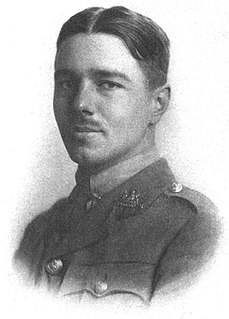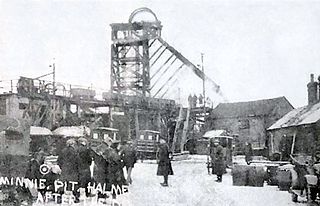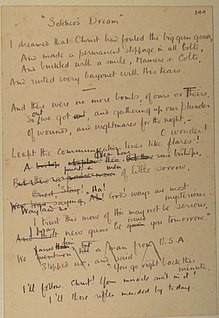Related Research Articles

John Keats was an English Romantic poet. He was one of the main figures of the second generation of Romantic poets, along with Lord Byron and Percy Bysshe Shelley, despite his works having been in publication for only four years before his death from tuberculosis at the age of 25.

Wilfred Edward Salter Owen, MC was an English poet and soldier. He was one of the leading poets of the First World War. His war poetry on the horrors of trenches and gas warfare was heavily influenced by his mentor Siegfried Sassoon, and stood in stark contrast both to the public perception of war at the time and to the confidently patriotic verse written by earlier war poets such as Rupert Brooke. Among his best-known works – most of which were published posthumously – are "Dulce et Decorum est", "Insensibility", "Anthem for Doomed Youth", "Futility", "Spring Offensive" and "Strange Meeting".

"Anthem for Doomed Youth" is a well-known poem written in 1917 by Wilfred Owen. It incorporates the theme of the horror of war.
Dulce et Decorum est is a poem written by Wilfred Owen during World War I, and published posthumously in 1920. The Latin title is taken from Ode 3.2 (Valor) of the Roman poet Horace and means "it is sweet and fitting ...". It is followed by pro patria mori, which means "to die for one's country". One of Owen's most renowned works, the poem is known for its horrific imagery and condemnation of war. It was drafted at Craiglockhart in the first half of October 1917 and later revised, probably at Scarborough but possibly Ripon, between January and March 1918. The earliest surviving manuscript is dated 8 October 1917 and addressed to his mother, Susan Owen, with the message: "Here is a gas poem done yesterday ."
The WH Smith Literary Award was an award founded in 1959 by British high street retailer W H Smith. Its founding aim was stated to be to "encourage and bring international esteem to authors of the British Commonwealth"; originally open to all residents of the UK, the Commonwealth and the Republic of Ireland, it latterly admitted foreign works in translation and works by US authors. The final three winners were Americans, and 2005 was the award's final year.
Jessie Pope was a British poet, writer and journalist, who remains best known for her patriotic motivational poems published during World War I. Wilfred Owen wrote his 1917 poem Dulce et Decorum est to Pope, whose literary reputation has faded into relative obscurity as those of war poets such as Owen and Siegfried Sassoon have grown.
Jon Howie Stallworthy, was a British literary critic and poet. He was Professor of English at the University of Oxford from 1992 to 2000, and Professor Emeritus in retirement. He was also a Fellow of Wolfson College, Oxford from 1986, where he was twice acting president. From 1977 to 1986, he was the John Wendell Anderson Professor of English at Cornell University.
(William) Harold Owen was the younger brother and biographer of the English poet and soldier, Wilfred Owen. He was born at the home of his paternal grandparents in Canon Street, Shrewsbury, Shropshire, where his parents and older siblings then lodged before his father moved on promotion to a station master's post at Birkenhead in 1898.
"Futility" is a poem written by Wilfred Owen, one of the most renowned poets of World War I. The poem was written in May 1918 and published as no. 153 in The Complete Poems and Fragments. The poem is well known for its departure from Owen's famous style of including disturbing and graphic images in his work; the poem instead having a more soothing, somewhat light-hearted feel to it in comparison. A previous secretary of the Wilfred Owen Association argues that the bitterness in Owen's other poems "gives place to the pity that characterises his finest work". Futility details an event where a group of soldiers attempt to revive an unconscious soldier by moving him into the warm sunlight on a snowy meadow. However, the "kind old sun" cannot help the soldier - he has died.
"1914" is a sonnet by Wilfred Owen. It deals with the atrocities of World War I.
"Sonnet On Seeing a Piece of our Heavy Artillery Brought into Action" is a poem by Wilfred Owen. It deals with the atrocities of World War I.
"Cramped in that Funnelled Hole" is a poem by Wilfred Owen. It deals with the atrocities of World War I.
"At a Calvary near the Ancre" is a poem by Wilfred Owen. The title references the Ancre, a tributary of the Somme. It was the scene of two notable battles in 1916.
To Eros is a poem written by Wilfred Owen.
"The Next War" is a poem by Wilfred Owen. It was written in late September 1917, and revised in July 1918. It is no. 160 in The Complete Poems and Fragments.
"Strange Meeting" is a poem by Wilfred Owen. It deals with the atrocities of World War I. The poem was written sometime in 1918 and was published in 1919 after Owen's death. The poem is narrated by a soldier who goes to the underworld to escape the hell of the battlefield and there he meets the enemy soldier he killed the day before.
"A New Heaven" is a sonnet by Wilfred Owen, written in England before Owen had seen active service in the trenches of France, probably in September 1916. Some MS drafts bear differing dedications. The poem was probably written in Milford Camp, Surrey, which was a part of Witley Camp.

"Miners" is a poem by Wilfred Owen. He wrote the poem in Scarborough in January 1918, a few weeks after leaving Craiglockhart War Hospital where he had been recovering from shell-shock. Owen wrote the poem in direct response to the Minnie Pit Disaster in which 156 miners died.

Soldier's Dream is a poem written by English war poet Wilfred Owen. It was written in October 1917 in Craiglockhart, a suburb in the south-west of Edinburgh (Scotland), while the author was recovering from shell shock in the trenches, inflicted during World War I. The poet died one week before the Armistice of Compiègne, which ended the conflict on the Western Front.
References
- ↑ Owen, Wilfred. With an Identity Disc. The war poems, edited by Jon Stallworthy (1994) 1917, p.g 11
- ↑ , Simcox, Kenneth "With an Identity Disc". The Wilfred Owen Association, 2002, accessed on 8/01/2015 at
- ↑ Stallworthy, Jon. Wilfred Owen: The War Poems. (1994), p.g xiii
- ↑ , Simcox, Kenneth "With an Identity Disc". The Wilfred Owen Association, 2002, accessed on 8/01/2015 at
- ↑ , Simcox, Kenneth "With an Identity Disc". The Wilfred Owen Association, 2002, accessed on 8/01/2015 at
- ↑ Stallworthy, Jon. Wilfred Owen: The War Poems. (1994), p.g 11